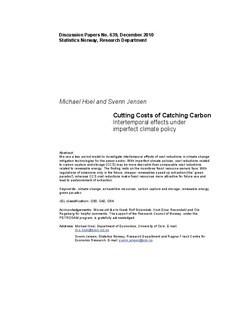| dc.contributor.author | Hoel, Michael | |
| dc.contributor.author | Jensen, Svenn | |
| dc.date.accessioned | 2011-01-26T08:51:12Z | |
| dc.date.available | 2011-01-26T08:51:12Z | |
| dc.date.issued | 2010 | |
| dc.identifier.issn | 0809-733X | |
| dc.identifier.uri | http://hdl.handle.net/11250/180255 | |
| dc.description.abstract | We use a two-period model to investigate intertemporal effects of cost reductions in climate change mitigation technologies for the power sector. With imperfect climate policies, cost reductions related to carbon capture and storage (CCS) may be more desirable than comparable cost reductions related to renewable energy. The finding rests on the incentives fossil resource owners face. With regulations of emissions only in the future, cheaper renewables speed up extraction (the `green paradox'), whereas CCS cost reductions make fossil resources more attractive for future use and lead to postponement of extraction. | en_US |
| dc.language.iso | eng | en_US |
| dc.publisher | Statistics Norway, Research Department | en_US |
| dc.relation.ispartofseries | Discussion Papers; 639 | |
| dc.subject | Climate change | en_US |
| dc.subject | Exhaustible resources | en_US |
| dc.subject | Carbon capture | en_US |
| dc.subject | Renewable energy | en_US |
| dc.subject | Klimaendringer | en_US |
| dc.subject | Fornybare energikilder | en_US |
| dc.subject | Karbonfangst | en_US |
| dc.subject | Miljøpolitikk | en_US |
| dc.subject | Energipolitikk | en_US |
| dc.subject | JEL classification: Q30 | en_US |
| dc.subject | JEL classification: Q42 | en_US |
| dc.subject | JEL classification: Q54 | en_US |
| dc.title | Cutting costs of catching carbon : intertemporal effects under imperfect climate policy | en_US |
| dc.type | Working paper | en_US |
| dc.source.pagenumber | 32 | en_US |
